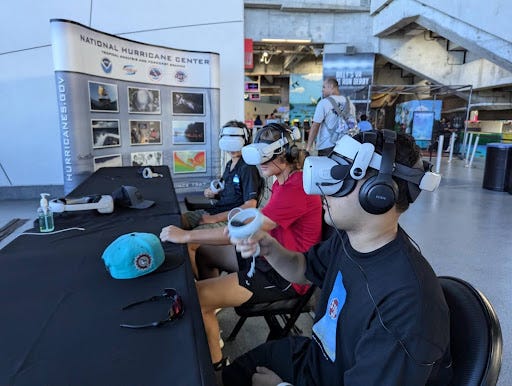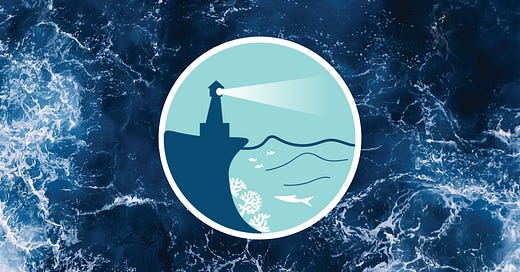ESP Advisors is a policy consulting firm specializing in ocean and coastal issues. Our bipartisan team includes alumni from the offices of Senate Majority Leader John Thune (R-SD), Senate Armed Services Committee Chair Roger Wicker (R-MS), House Natural Resources Committee Ranking Member Jared Huffman (D-CA) and the late Rep. Don Young (R-AK), former Dean of the House and longtime ocean champion.
We act as a bridge between the policy world and the science community to influence national policy through government relations and communications strategies, focusing on connecting stakeholders across the political spectrum to drive change on marine matters.
Learn more about our services here, and reach out to Emily if you or your organization need help successfully navigating these turbulent waters (emily@espadvisor.com).
ESP Advisors provides Ocean Policy Insights as a free resource to keep the ocean community informed about the fast-paced world of federal policy. If you find this resource helpful, please consider making a donation to help offset the costs of production. Click here to donate (note: this is not a tax-deductible contribution).
Let’s dive in on what’s up in Washington.
Who’s in session?
Neither the House nor the Senate are in session this week.
Make sure you have the ESP Advisors printable 2025 Congressional Schedule and our public 2025 Congressional Google calendar at your fingertips.
ICYMI: Check out our recent blog posts:
News Highlights
Rep. Raúl Grijalva (D-AZ-07), former Chair of the House Committee on Natural Resources and longtime champion of land and water conservation, passed away after a battle with cancer.
House Science Committee Democratic leaders sent letters to DOE, NASA, NIST, NSF. and NOAA, requesting that the agencies disclose their reduction in force (RIF) plans with the Committee immediately.
The Modernizing Access to our Public Oceans (MAPOceans) Act (S.759), by Sens. Ted Cruz (R-TX) and Angus King (I-ME), was reintroduced and passed out of the Committee on Commerce, Science, and Transportation. The bill would require NOAA to make location data related to federally managed waters digitally and publicly available.
Written by Emily
Reductions in Force (RIFs)
Federal agencies submitted their plans detailing reductions in force (RIFs), office consolidations, and function eliminations last week. Per a February 26 joint memo from the Office of Management and Budget and Office of Personnel Management, each plan had to include a report about statutes that established the agency or its requirements along with recommendations to eliminate or consolidate components where possible. Agencies must implement their plans in the next 30 days and must submit longer-term plans, including permanent restructuring, further workforce reductions, and cost-cutting measures by April 14.
The Commerce Department, which includes NOAA, plans to shrink its workforce by 20% without layoffs, relying on early retirements, buyouts, and attrition. About 1,600 employees accepted “deferred resignation,” and will leave after September, while 850 were let go during probation. The agency is offering Voluntary Early Retirement (VERA) to about 10,000 eligible employees, though not all are expected to take it. To further cut costs, Commerce aims to eliminate vacant funded positions and may extend Trump’s government-wide hiring freeze beyond April.
Meanwhile, two federal judges reversed some initial firings of thousands of probationary federal employees, requiring officials to reinstate workers at 18 federal agencies.
Government Funded through the End of the Fiscal Year
Last week, Congress voted to extend government funding at FY24 levels through the end of FY25. There’s been a lot of confusion, so here’s a quick breakdown:
The continuing resolution (CR) extends FY24 funding levels, which were negotiated when Democrats controlled the Senate and signed by President Biden.
CRs aren’t ideal. Imagine your household budget: last year, you bought a car; this year, you need a new roof. If your budget stays the same, you’d have too much for a car but not enough for home repairs. The same applies to federal spending on things like ships and satellites.
Cuts in the CR mostly come from removing earmarks, which are typically one-year funding items, along with a few other minor changes.
Is the CR a “blank check” for the Trump Administration? Yes and no.
No, in that it doesn’t provide any additional authority or flexibility. It keeps funding at last year’s levels with the same guidance (report language) from Congress regarding how those funds should be spent. The guidance from the original spending bill is continued in a CR.
Yes, in that this administration has already pushed legal boundaries on congressional authority and intent and may choose to ignore the report language guidance. Some Democrats pushed for additional language that would have reigned in DOGE and the administration’s actions to reduce the federal workforce; that language was not included in the final CR.
The 1% automatic sequester, as required by the Fiscal Responsibility Act, likely won’t happen. Lawmakers and the administration appear to have agreed to treat a full-year CR as full appropriations, avoiding the cut.
DC’s budget took a hit. The CR rolled the city’s budget back to FY24 levels, slashing $1.1 billion mid-year (and these are not federal funds). The Senate passed a fix, but it’s waiting on a House vote.
Next Steps: Budget Reconciliation, FY26 Government Funding, and Raising the Debt Ceiling
Members of Congress have already begun accepting appropriations requests for next year. The Appropriations Committees are set to begin the FY 2026 appropriations process soon, alongside efforts on budget reconciliation. President Trump has yet to release his FY 2026 budget, which will outline his key policy priorities and their potential impact on federal deficits, economic growth, and other areas. House Appropriations Chairman Tom Cole (R-OK-04) indicated the budget may be delayed until late April or early May.
Congress must also address the debt limit, either through a budget reconciliation bill or a separate measure. To prevent exceeding the debt ceiling, the Treasury Department began using “extraordinary measures” on Jan 21. The Congressional Budget Office (CBO) is expected to release its estimate for the “X date”—when the debt ceiling would be breached—in the coming weeks.
Not sure how to navigate the chaos? We’re here to help. Reach out: emily@espadvisor.com.
Important Dates and Deadlines
Tuesday, September 30: FY26 government funding deadline
March 25, 2025
10:00 AM — FY2026 Member Day Hearing; House Appropriations Subcommittee on Interior, Environment, and Related Agencies
Introductions
Rep. Robert J. Wittman (R-VA-01) and Sen. Chris Van Hollen (D-MD) reintroduced the Chesapeake Bay Conservation Acceleration Act (H.R.2091/S.971). The bill would support voluntary conservation efforts to improve water quality in the Chesapeake Bay watershed and increase harvesting of invasive blue catfish.
Rep. Raúl Grijalva (D-AZ-07), who passed away last week, and Sen. Ed Markey (D-MA) reintroduced the Stop Giving Big Oil Free Money Act (H.R.2053/S.1030). The bill would prohibit the Department of Interior from issuing a new oil or natural gas production lease in the Gulf of Mexico (sic) to a company holding a royalty-free lease unless the company renegotiates the existing lease(s).
Sens. Brian Schatz (D-HI) and Roger Marshall (R-KS) introduced the Improving Flood and Agricultural Forecasts Act of 2025 (S.613) to codify and expand NOAA’s Mesonet Program to improve extreme weather forecasting.
Sen. Lisa Murkowski (R-AK) introduced a bipartisan bill to establish an Ambassador-at-Large for Arctic Affairs (S.1000). Sen. Murkowski advocated for the position’s creation under the Biden Administration.
Rep. Gary Palmer (R-AL-06) and Sens. Katie Britt (R-AL) and Brian Schatz (D-HI) reintroduced Lulu’s Law (H.R.2076/S.1003) would authorize federal agencies to send wireless emergency alerts to the publics in case of a shark attack or the presence of shark attack conditions.
Sens. Roger Wicker (R-MS), Tammy Baldwin (D-WI), and John Boozman (R-AR) introduced the Mississippi River Fisheries Commission Act of 2025 (S.1078) to establish a federally funded commission to manage fisheries, invasive species, and habitat restoration in the Mississippi River Basin. Reps. Troy Carter, Sr. (D-LA-02) and Mike Ezell (R-MS-04) introduced the House companion last month (H.R.1514).
Reps. Mark E. Green (R-TN-07), Jen Kiggans (R-VA-02), and Don Davis (D-NC-01) introduced the Save our Shipyards (SOS) Act of 2025 (H.R.2125) to establish a National Commission on the Maritime Industrial Base that would evaluate the current status of the U.S. maritime industry and identify barriers to growth.
Updates
The Modernizing Access to our Public Oceans (MAPOceans) Act (S.759), by Sens. Ted Cruz (R-TX) and Angus King (I-ME), was reintroduced and passed out of the Committee on Commerce, Science, and Transportation. The bill would require NOAA to make location data related to federally managed waters digitally and publicly available.
Sens. Ed Markey (D-MA) and John Cornyn (R-TX) reintroduced and advanced through the Commerce, Science, and Transportation Committee the Sea Turtle Rescue Assistance and Rehabilitation Act of 2025 (S.843). The bill would create a new grant program to fund sea turtle rescue, recovery, and research in the U.S. Rep. Bill Keating (D-MA-09) reintroduced the House companion bill in January (H.R.347).
People
Representative Bruce Westerman (R-AR-04), Chair of the House Natural Resources Committee, released a statement on the passing of former Committee Chair Raúl Grijalva.
Representative Jared Huffman (D-CA-02), Ranking Member of the House Natural Resources Committee, released a statement on the passing of former Committee Chair Raúl Grijalva.
House Appropriations Committee Chair Tom Cole (R-OK-04) released a statement on the passing of former House Appropriations Chairwoman Nita M. Lowey.
House Appropriations Committee Ranking Member Rosa DeLauro (D-CT-03) released a statement on the passing of former House Appropriations Chairwoman Nita M. Lowey.
Fisheries and Ecosystems
NOAA Fisheries Office of Law Enforcement has launched a pilot test of a rapid PCR device that enables officers to perform genetic analysis in the field, expediting species identification at ports to prevent seafood fraud and ensure compliance with U.S. import laws.
Senator Ted Cruz (R-TX), Chair of the Senate Committee on Commerce, Science, and Transportation, released a statement after a recent committee markup and consideration of two nominations.
Senator Maria Cantwell (D-WA), Ranking Member of the Senate Committee on Commerce, Science and Transportation, released her opening statement from a recent committee markup and consideration of the nomination of Michael Kratsios to be the Director of the Office of Science and Technology Policy.
Senator Shelley Moore Capito (R-WV), Chair of the Senate Environment and Public Works (EPW) Committee, applauded the Environmental Protection Agency’s (EPA) and the U.S. Army Corps of Engineers’ (USACE) work to revise and update the definition of Waters of the United States (WOTUS) rule.
Chair of the House Committee Natural Resources, Bruce Westerman (R-AR-04), published several statements in support of his Endangered Species Act Amendments of 2025.
Ranking Members Jared Huffman (D-CA-02) of the Committee on Natural Resources (HNR), Zoe Lofgren (D-CA-18) of the Committee on Science, Space, and Technology (SST), Maxine Dexter (D-OR-03) of the House Natural Resources Subcommittee on Investigations and Oversight, and Gabe Amo (D-RI-01) of the Space, Science, and Technology Subcommittee on Environment sent a letter to Department of Commerce Secretary Lutnick, requesting information regarding the Trump Administration’s plan to terminate at least 34 National Oceanic and Atmospheric Administration (NOAA) office leases nationwide.
House Science Committee Democratic leaders sent letters to DOE, NASA, NIST, NSF. and NOAA, requesting that the agencies disclose their reduction in force (RIF) plans with the Committee immediately.
House Committee on Agriculture Chair, Glenn ‘GT’ Thompson (R-PA-15), issued a statement on EPA Administrator Lee Zeldin’s announcement on the agency’s plans to review and revise the WOTUS rule.
Transportation and Infrastructure Committee Chairman Sam Graves (R-MO-06), House Republican Conference Chairwoman Lisa McClain (R-MI-09), Water Resources and Environment Subcommittee Chairman Mike Collins (R-GA-10), and Highways and Transit Subcommittee Chairman David Rouzer (R-NC-07) praised the Trump Administration’s commitment to review the WOTUS rule.
Offshore Wind and Energy
President Donald Trump signed S.J.Res.11, overturning a Bureau of Ocean Energy Management rule that required new Outer Continental Shelf oil and gas leaseholders to submit archaeological reports for unsurveyed areas, aiming to reduce compliance costs and revive offshore energy development.

The new virtual reality simulation Weather the Storm, funded by NOAA’s Weather Program Office and developed in collaboration with the University of Georgia, Clemson University, Georgia Sea Grant, and South Carolina Sea Grant, aims to enhance storm surge preparedness by demonstrating the importance of coastal evacuation orders.










